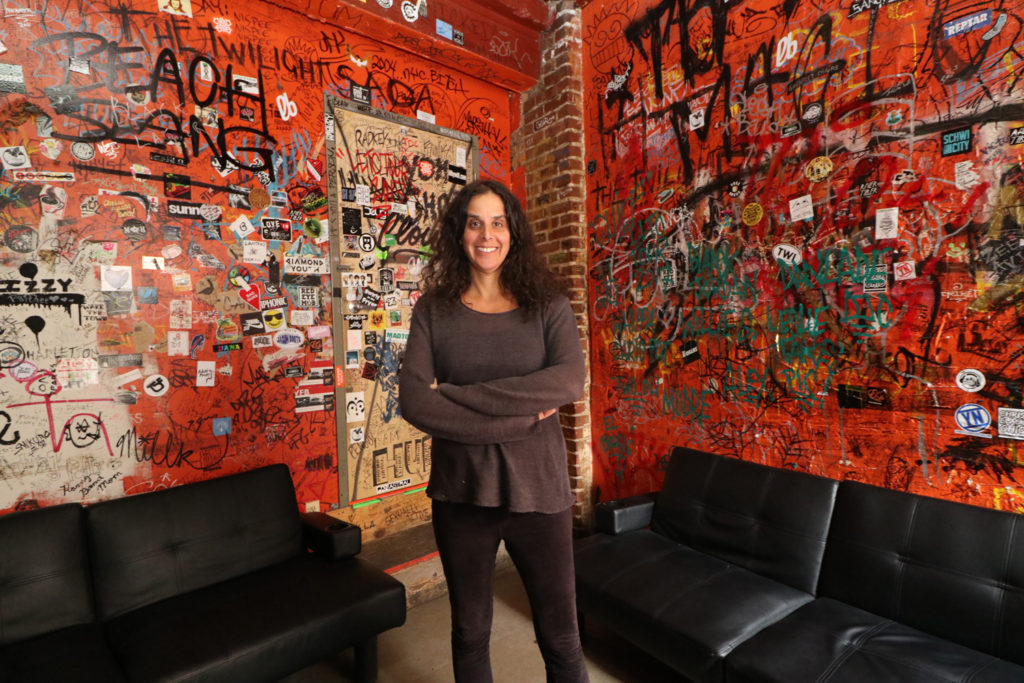Jewish musicians, promoters and venue operators hit all the right notes to keep Cleveland rockin’

From the back of the stage to the front, Andrea Belding-Elson, Joshua Riehl and Chayla Hope of Seafair perform at Brite Winter on the West Bank of The Flats in Cleveland. Photo Robert Muller / Brite Winter.
By Carlo Wolff
Weaving original rock ’n’ roll music into the community fabric is a key goal of partners Chayla Hope and Teddy Eisenberg, respectively lead singer of Seafair and the group’s manager. Performing original rock is critical to Sean Benjamin, a singer-songwriter from Lakewood. And helping spread word of the area’s diverse rock scene matters to Kathy Blackman of Cleveland Heights, who has owned the Grog Shop in that inner-ring suburb for more than 25 years.
Hope, 31, is the leader of Seafair, an eclectic, six-piece group of great range and richness. Eisenberg, 24, manages Seafair and, with Hope and concert promoter Jeanette Sangston, runs Sixth City Sounds, a nonprofit dedicated to furthering the Cleveland rock scene.eaving original rock ’n’ roll music into the community fabric is a key goal of partners Chayla Hope and Teddy Eisenberg, respectively lead singer of Seafair and the group’s manager. Performing original rock is critical to Sean Benjamin, a singer-songwriter from Lakewood. And helping spread word of the area’s diverse rock scene matters to Kathy Blackman of Cleveland Heights, who has owned the Grog Shop in that inner-ring suburb for more than 25 years.
Hope’s daytime job is vinyl press operator at Gotta Groove Records in downtown Cleveland. Eisenberg is manager of business operations for EZ ERISA Plan, a sister company to the Cleveland law firm Zimon LLC. Both attend Temple Israel Ner Tamid in Mayfield Heights, where his father, Matthew, is the rabbi.
Benjamin, 34, performs solo around the area – and around the world. By day, he’s digital marketing manager at the Jewish Federation of Cleveland. The son of a Jewish father and an Irish mother who converted to Judaism when she got married, he was raised in a Jewish home. He recently performed in England, Scotland and Ireland, fulfilling a dream that resonated with his background. Benjamin used to attend Temple Ner Tamid in Euclid and was bar mitzvahed there. (In 1997, Temple Ner Tamid merged with Temple Israel of Greater Cleveland to become Temple Israel Ner Tamid.)
Blackman attends Anshe Chesed Fairmount Temple in Beachwood.
All operate in the shadow of Live Nation, the area’s largest concert promoter, where Michael Belkin is senior vice president, carrying on the tradition of his father, Mike, and his uncle, Jules. Mike and Jules Belkin founded Belkin Productions, an ancestor of Live Nation, in the mid-’60s. Belkin Productions was the premier concert promoter in Cleveland and the Midwest until its sale in 2001.
Working for the common good
Seafair is deep into a follow-up to its first album, “The Querencia,” released in 2015. “We’re working on all of the songs, and there are about six we’re really proud of so far,” says Hope, who converted to Judaism last June. “Once we get there, we’re going straight to the studio.”
A favorite at Brite Winter, where it co-headlined in February, Seafair was founded in 2012. Eisenberg, who manages the band “on a daily basis,” says Seafair hopes to have the new album, or at least another single, out by fall.
He also finds time for both Seafair and Sixth City because he has “passion for the local scene and what it provides the city of Cleveland as a tangible asset both economically and artistically.”
Sixth City aims to be an advocacy-oriented clearing house for local musicians, Eisenberg says.
“How do we take it to the next level? How do we raise the profile of what’s happening here? How do we let people know about it?”

Chayla Hope and Teddy Eisenberg, two-thirds of the team behind Sixth City Sounds. Photo Suzuran Photography.
To answer such questions, Sixth City presents Mixing Sessions, occasional gatherings where musicians, venue owners and music businesspeople can network and discuss issues; free pop-up concerts like ones last summer that were part of the Regional Transit Authority’s Summer Jam Series; partnerships with institutions like RTA and Destination Cleveland designed to spotlight local music in more events and spaces throughout the city; and CLE Music Shelves, displays of CDs by local musicians in local coffee shops, clothing stores and breweries frequented by people who may no longer go to the region’s few remaining music stores.
“The shelves strengthen the public’s awareness of emerging talent while allowing artists to cross-promote with local business,” Eisenberg says. “Participating artists receive 100 percent of the sale proceeds.”
Among recent outlets: CLE Urban Winery in Cleveland Heights, Coquette Patisserie in Cleveland’s University Circle neighborhood, Nature’s Oasis in Lakewood, Wadsworth Brewing Company in Wadsworth and Whiskey Grade in Cleveland’s Ohio City neighborhood.
“We wanted to be in locations where people are not used to seeing local music,” he says.
“There are so many people who just adore Cleveland, buying local T-shirts and all that, but they don’t realize how much talent we have here and how incredible the music scene is here,” adds Hope. “I’m hoping that this is kind of a way to tell them, ‘Hey, we’re here – check it out.’”
On his own
“I’m an acoustic singer-songwriter, very influenced by a lot of things,” says Benjamin, a cat lover who cites touchstones such as ’90s alternative rock, soul singers Wilson Pickett and Percy Sledge, neo-soul groove-master G. Love & Special Sauce, and low-impact troubadours Damien Rice and David Gray.
Years ago, Benjamin issued material on the now-defunct neo-soul label FTF Records, but now, all his material is self-released. “The whole landscape of playing music has changed,” he says. “A label is not as required as it used to be. (But) it would be great for me right now because I don’t have the bandwidth to do all this stuff on my own.”
Benjamin, who in January released “Elaborate,” his first single in years, sells most of his music through online channels like iTunes and Amazon, pressing limited runs of his CDs to sell at shows.

Musician Sean Benjamin. Photo Sean Benjamin.
Culturally, Cleveland is good for the independent musician, he says, despite “the fact that there’s not a concentrated music scene in one geographic part. You almost have to treat Cleveland as a couple of different markets. I don’t market my Lakewood shows to people in Lyndhurst because of the distance.”
Among his favorite venues: House of Blues in downtown Cleveland and The Brothers Lounge at West 116th Street and Detroit Avenue, also in Cleveland.
Benjamin credits Sixth City for “trying to be that cement that holds this all together, that rising tide that lifts all boats. There are people out there really trying to help the community, so there is a scene, certainly for the musicians.
“I haven’t done anything with Sixth City Sounds yet,” he adds. “I just think it’s good for the music scene in general. I currently do the bulk of my own promotion/marketing, but I have worked with people in the past and will again to give me more time to work on the songs, recordings, performances.”
Spreading the faith
Kathy Blackman sees herself as a facilitator, a go-between. Not only does she help local bands by placing them on bills at The Grog Shop, she recommends them to promoters in other cities and occasionally gets them spots on national bills presented by Live Nation at House of Blues and elsewhere.
“As an individual, if I can help bands get on bigger shows in other clubs around the city, I’m happy to assist,” she says. “Sometimes, Live Nation will reach out and ask for local band recommendations, and we have a large Rolodex of the people that play here; we’re more aware of the local pulse, of the ground floor. Through the years, I’ve given referrals to bands who want to get a show in Detroit, Columbus or Cincinnati. I always am willing to give recommendations to other club owners out of our region to help Cleveland bands get shows out of the area.”

Grog Shop owner Kathy Blackman inside the venue’s backstage band room. Photo by Michael C. Butz.
Blackman does her best to keep up with a constantly changing scene and is eager for the next breakout band.
“A few have done well nationally in recent years, like Cloud Nothings, and Kid Cudi would be bigger than that,” she says. “I think that always helps the scene in general, when people break out. Trumpadelic is another one that’s doing well nationally.”
Blackman also notes there are other industries in the area associated with rock, like Akron-based guitar pedal manufacturer Earthquaker Devices, and Cleveland’s Gotta Groove Records “does a lot of cool stuff.” Such behind-the-scenes operations also are integral to the region’s musical fabric. So are higher-profile organizations like the Rock & Roll Hall of Fame, which just last week staged its 2018 induction ceremonies in Cleveland and has featured local bands in its summer concerts.
At the same time, “Cleveland is considered a second-tier market, not a first-tier market like Chicago, New York or Los Angeles,” Blackman says. “We’re at the same level as, like, Pittsburgh. … We’re definitely losing stuff to Columbus because I think they have a younger demographic, in the last five to 10 years for sure. That being said, we do still have the Rock Hall, which is an anchor. I think in terms of small venues like our club, it’s pretty similar, but the national shows tend to skip Cleveland more than they used to.”
There’s also Live Nation, which Blackman calls a “gatekeeper” for local bands it occasionally books into places like House of Blues and Jacobs Pavilion at Nautica.
And there’s the vitality of the scene itself. Says Eisenberg: “We’re fortunate here in Cleveland to have a pretty robust network of independent venues like the Grog Shop with Kathy Blackman, the Beachland Ballroom with Cindy Barber,” a bowling alley in Lakewood called Mahall’s, and The Happy Dog, which has outlets on both sides of Cleveland. These venues provide “a space for local talent to perform and flourish and reach an ever-growing audience.” js
